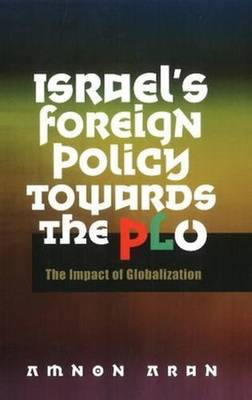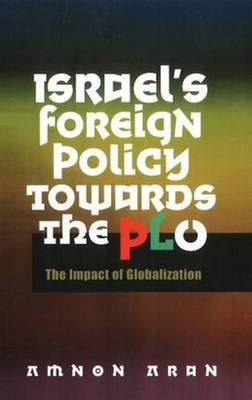
En raison d'une grêve chez bpost, votre commande pourrait être retardée. Vous avez besoin d’un livre rapidement ? Nos magasins vous accueillent à bras ouverts !
- Retrait gratuit dans votre magasin Club
- 7.000.000 titres dans notre catalogue
- Payer en toute sécurité
- Toujours un magasin près de chez vous
En raison de la grêve chez bpost, votre commande pourrait être retardée. Vous avez besoin d’un livre rapidement ? Nos magasins vous accueillent à bras ouverts !
- Retrait gratuit dans votre magasin Club
- 7.000.0000 titres dans notre catalogue
- Payer en toute sécurité
- Toujours un magasin près de chez vous
Israel's Foreign Policy Towards the PLO
The Impact of Globalization
Amnon Aran
Livre broché | Anglais
34,95 €
+ 69 points
Format
Description
This detailed examination of Israeli foreign policy towards the Palestinian Liberation Organization (PLO) between the 1967 war and the 2005 withdrawal from the Gaza Strip focuses on the impact and process of globalisation on the Israeli state's politics, economy, society and culture. In order to determine how interfacing developed between foreign policy and globalisation a theoretical framework is presented that brings together two established approaches that hitherto have advanced in parallel: foreign policy analysis and globalisation theory. This is the first attempt within the discipline of International Relations to theorise the relationships between foreign policy and globalisation. Causal relationships underpinning Israeli foreign policy -- involving government, the state, the economy, social stratification, and the media -- are linked to globalisation by specific example. Conventional accounts of this relationship strip military and political factors of any significance in terms of the conceptualisation of globalisation and its causes, in favour of spatio-temporal and economic dimensions. The state is viewed as being compelled to transform in response to the pressures of globalisation. But in the case of Israel the state acted proactively by using foreign policy towards the PLO as a key site of action to capture the opportunities and cope with the challenges presented by globalisation. To date there have been only partial historical accounts of Israeli foreign policy towards the PLO in the context of globalisation. It is generally understood that foreign policy towards the PLO became entangled with globalisation due to the socio-economic and cultural globalisation of Israel in the mid-1980s, but this study shows that the increasing impact of military and political globalisation during the Cold War on the Arab-Israeli conflict resulted in Israeli foreign policy towards the PLO, and globalisation effects in Israel, becoming entwined from the early 1970s.
Spécifications
Parties prenantes
- Auteur(s) :
- Editeur:
Contenu
- Nombre de pages :
- 176
- Langue:
- Anglais
Caractéristiques
- EAN:
- 9781845194833
- Date de parution :
- 23-03-11
- Format:
- Livre broché
- Format numérique:
- Trade paperback (VS)
- Dimensions :
- 157 mm x 221 mm
- Poids :
- 362 g

Les avis
Nous publions uniquement les avis qui respectent les conditions requises. Consultez nos conditions pour les avis.






